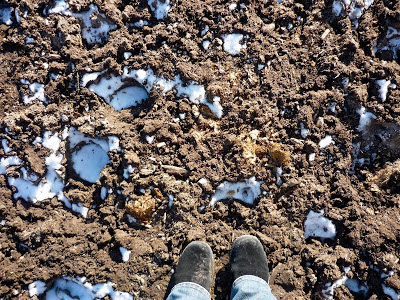Przysieki, Polska, 11-go grudnia 2010 r.
Autor: Henryk Bielamowicz; Wikimedia Commons
I remember that for me and Katia, my Polish-Lithuanian friend, the Polish months were hard to learn, since they are so different from both English and her native Russian.
When Katia and I were sharing the Embassy apartment that was assigned to me in Warsaw, we had a piece of paper taped on the wall next to the kitchen table with the names of the months in Polish and Russian.
Like with all words when learning a foreign language, it always helps to have context, and context can often come in the form of
etymology. (Often my students who hadn't previously been language people have trouble with this word, and like to confuse it with entomology!)
This is especially the case with the names of the months in Polish -- and Czech and Ukrainian, whose months are especially similar to Polish. (The Ukrainian for December is almost the same as in Polish --
грудень -- hruden" -- the g in Polish is often an h in Ukrainian or Slovak.)
For the most part, the Slavic month names relate to what is going on nature during those times in the year.
In Polish, the current month is
grudzień - which sounds nothing like December, and has nothing to do with being the tenth month.
Rather, the etymology of
grudzień has to do with the solid clods of earth that are created when the fields ploughed in autumn freeze. Thus, it is the "month of clods"...
Autorka: Brooke Way.
Used with the author's permission.
See for example Wikidictionary, which says that this word comes from:
the proto-Slavic *grudьńь[2] meaning the period when the earth is frozen, covered with clods[2]
As someone on the
MSZ site writes:
"Mówimy w Polsce, że idzie jak po grudzie, kiedy coś postępuje z trudem, opornie, sprawia trudności" -- "We say in Poland that it's like 'walking across clods' when progress is difficult, slow and causes problems."
In language learning, context might also come from sayings (
przysłowia).
In folk culture, there are often weather-related sayings, for example, that go with different days of different months, sometimes associated with the patron saint of that day.
For December, there are various Polish sayings, of which this is just one example:
Kto bez kożucha grudzień przechodzi, w Jana ciepło mu zaszkodzi.
Whoever goes through December without a sheepskin (coat) will suffer because of the heat on [St.] John's [Day]. [St. John's Day is also known as Midsummer's Day, 24 June.]
Autor: Henryka Rodakowski.
"Chłopski rzeźbiarz" from the series "Album Pałahickie", 1867.
Watercolor on paper. Muzeum Lubuskie in Gorzów Wielkopolski.
And, nowadays still a common piece of winter gear, and one that usually represents a substantial investment (but I see there are some good deals to be had on used ones!):















